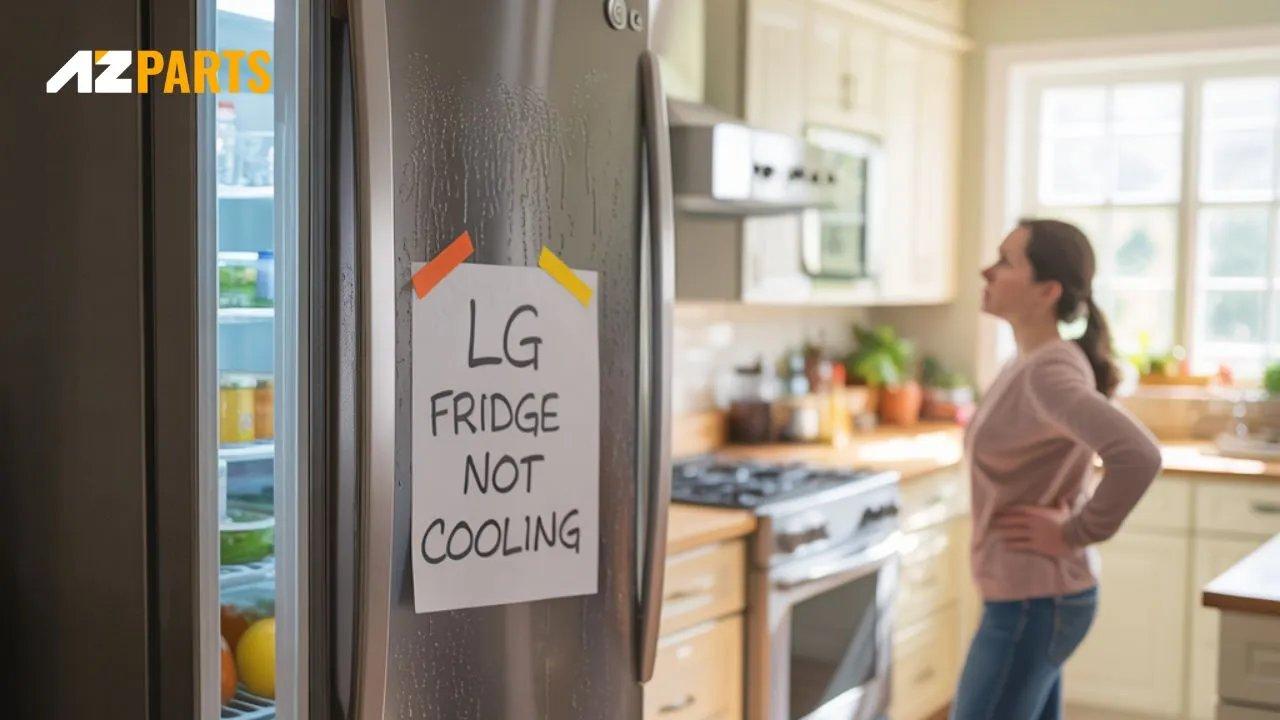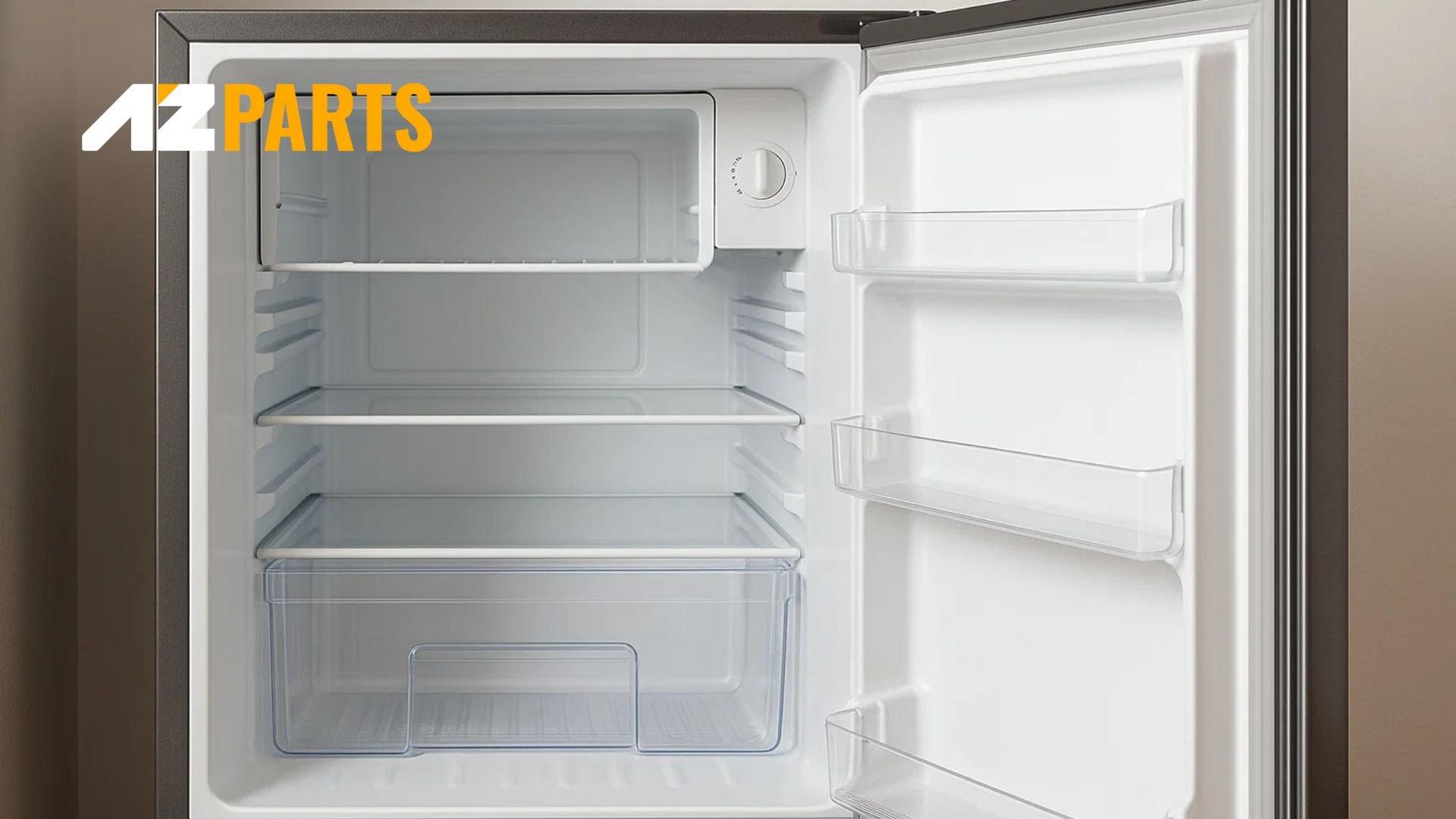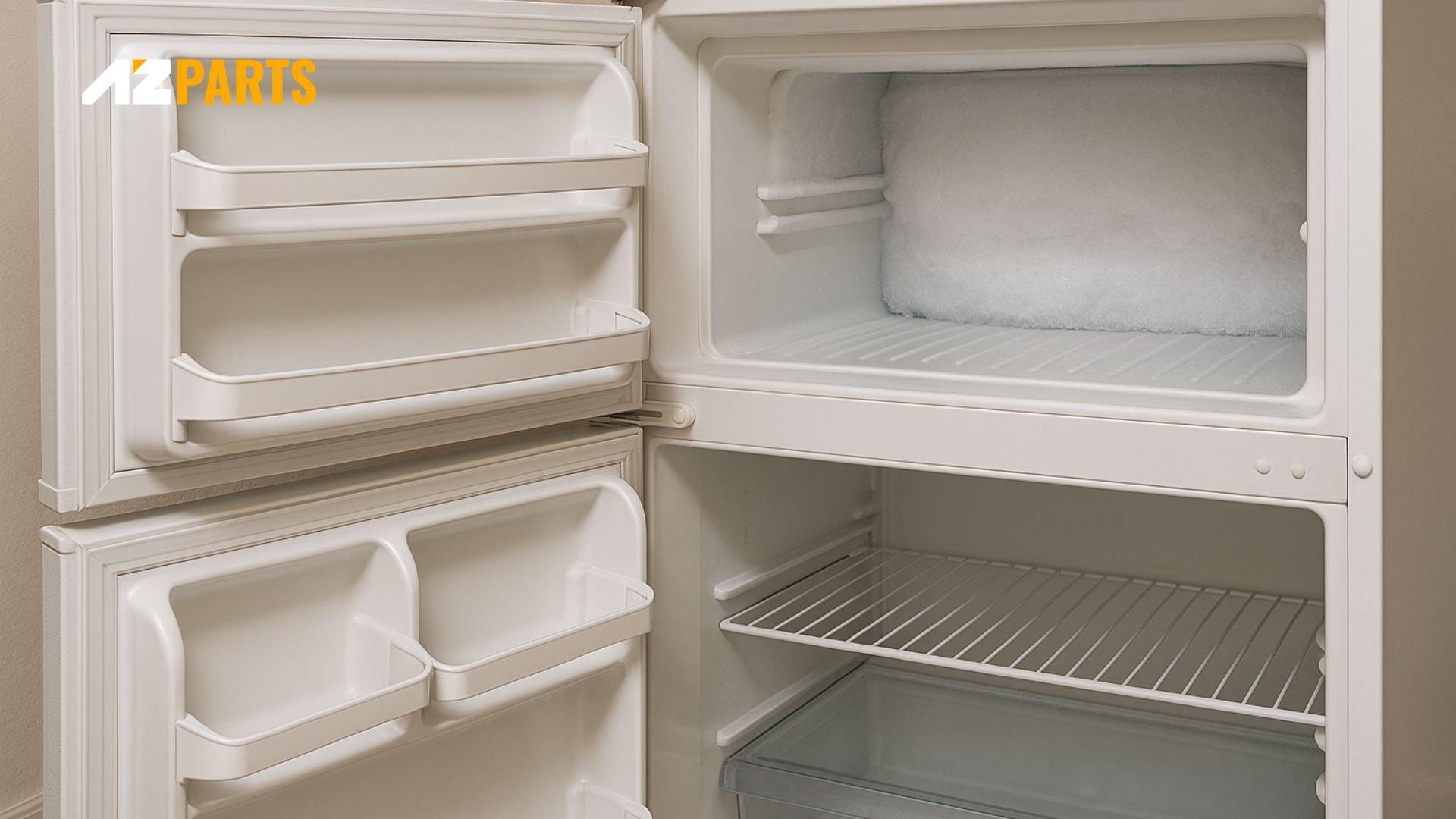Repair help
7 Steps to Fix a Refrigerator Making Loud Noise
AZparts Team
Updated on July 31, 2025
8 min read
Is your refrigerator making an unusually loud noise? This could be a sign of internal issues like a faulty evaporator fan, ice buildup in the freezer, or loose components. If left unchecked, the noise could worsen and lead to costly repairs or energy waste. In this guide, AZParts walks you through 7 practical steps to troubleshoot and fix a noisy refrigerator restoring peace and extending the life of your appliance.

1. Condenser Fan Malfunction
If your refrigerator is making a loud humming or buzzing sound from the back or bottom, the condenser fan may be the cause. This fan helps release heat from the condenser coils and keeps the cooling system stable. However, if the fan stops working properly, it can no longer cool the coils efficiently, causing the system to overheat and produce excessive noise.
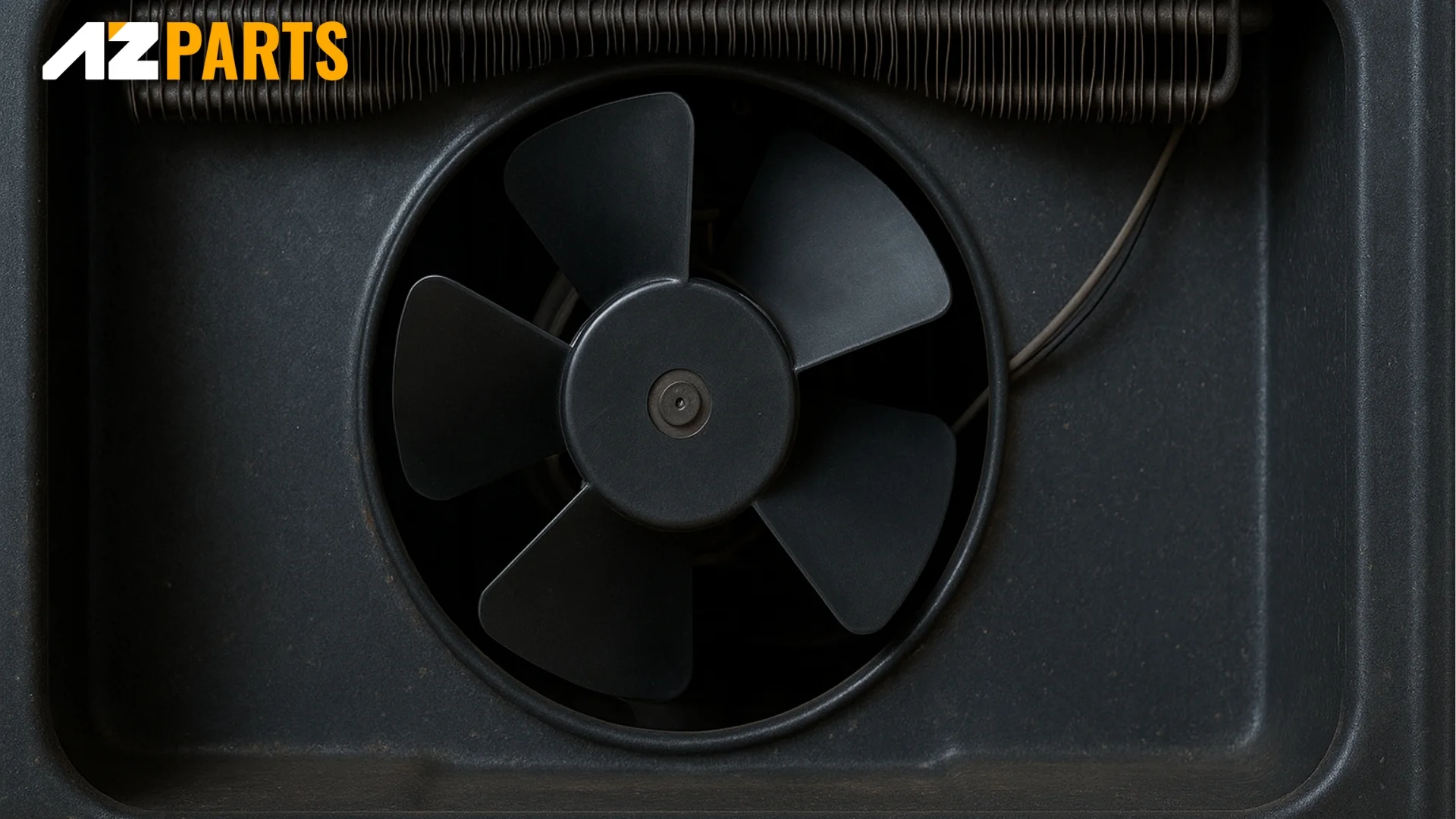
Close-up of inactive refrigerator condenser fan, dusty and unpowered (Source: AZParts)
Possible Causes:
- Worn-out motor: Over time, the condenser fan motor can degrade or seize up, causing a loud grinding or humming sound.
- Damaged start relay or overload protector: These components work with the compressor and fan motor. If they fail, the fan might stall or run erratically, producing unusual sounds.
- Obstructed fan blades: Debris, dust, or bent blades can cause friction, leading to mechanical noise during operation.
How to Fix:
- Replace the fan motor: If the refrigerator motor is worn or dead, replace it with a compatible unit from AZParts’ selection of refrigerator fan motors.
- Inspect and replace faulty relays or protectors: Use a multimeter to test the fridge start relay and the refrigerator overload protector. Faulty parts can be swapped out using genuine replacements from AZParts.
- Clear obstructions: Disconnect power and check for debris around the fan blades. Gently clean the area and adjust any bent components to restore smooth operation.
2. Evaporator Fan Obstruction
If your fridge makes a whirring or scraping noise when the door is closed but becomes silent when opened, it's likely due to an issue with the evaporator fan. This fan circulates cold air throughout the fridge and freezer compartments. Therefore, if something is blocking the blades or if the motor is weak, the fan may create unusual noises while running.
Possible Causes:
- Ice buildup: Ice forming around the fan blades due to defrost failure can lead to friction noises.
- Debris or foreign objects: Sometimes packaging material or small items fall into the fan housing.
- Faulty fan motor or thermostat: A malfunctioning motor can cause inconsistent operation and noise. Likewise, a bad thermostat can cause overcooling, leading to ice formation.
How to Fix:
- Manually inspect for ice or debris: Defrost the fridge manually if there’s visible ice around the fan area. Clear out any obstructions.
- Test and replace the evaporator fan motor: If the motor is making excessive noise or not spinning freely, replace it with a new one from AZParts’ evaporator motor collection.
- Check the thermostat: A faulty refrigerator thermostat may be running the fan too long or not regulating temperature properly. Consider replacing it with a compatible part from AZParts.
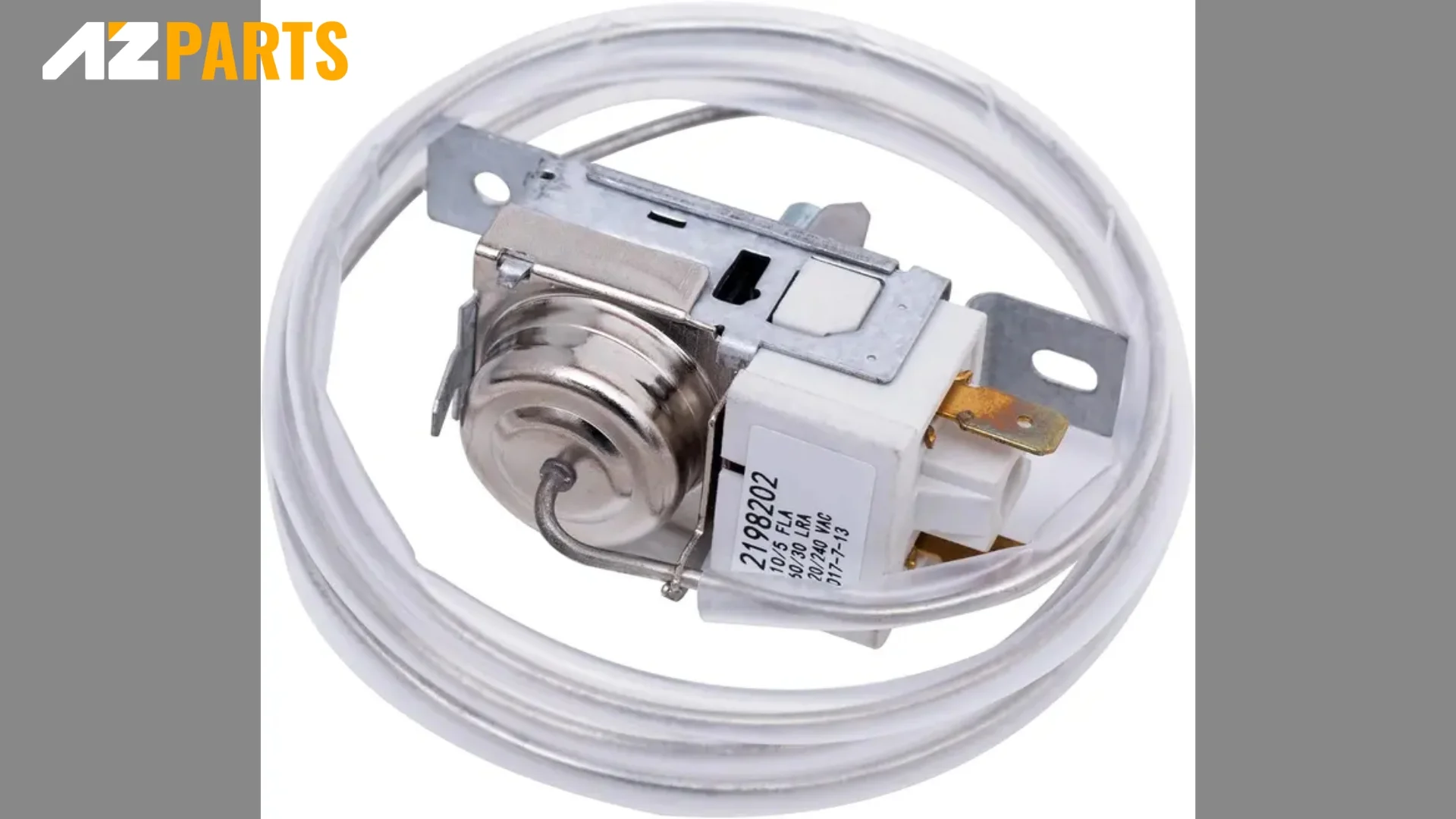
AZParts refrigerator thermostat (Source: AZParts)
3. Condenser Coil Dirt Accumulation
If your refrigerator is making louder-than-usual noises while also struggling to stay cold, the problem might not lie in any moving parts but rather in dirty condenser coils. These coils are designed to dissipate heat from the refrigerant, but when they become coated in dust or pet hair, airflow is restricted, forcing the fan and compressor to work harder.
As a result, the refrigerator becomes both noisier and less efficient, potentially driving up energy costs if not addressed.
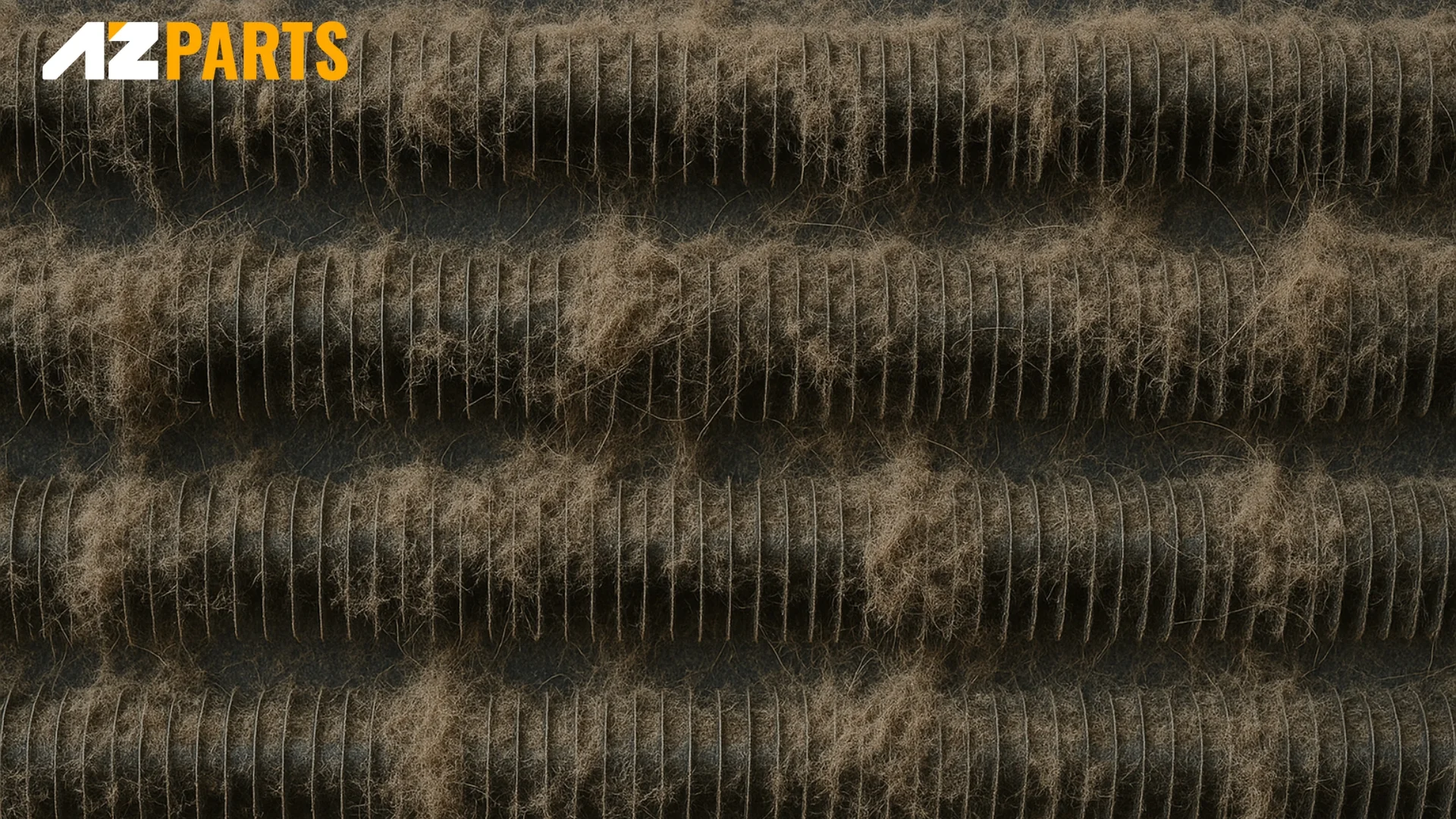
Heavy dust and pet hair accumulation on refrigerator condenser coils (Source: AZParts)
Possible Causes:
- Dust, lint, or pet hair buildup: This reduces airflow and heat dissipation, increasing strain on the cooling system.
- Overworked compressor and fan: Dirty coils can cause these parts to overcompensate, creating mechanical humming or grinding noises.
- Neglected maintenance: Coils that haven’t been cleaned in over 6–12 months are often the root cause of noise and inefficiency.
How to Fix:
- Unplug and clean the coils: Use a soft brush or vacuum with a narrow nozzle to remove dust from the condenser coils.
- Clean surrounding areas: Ensure the back and underside of the fridge are clean to maintain airflow.
- Schedule regular maintenance: Prevent future noise issues by cleaning coils every 6 months, especially if your kitchen is prone to dust or pet fur.
4. Compressor Noise Issue
If your refrigerator is making a loud humming, clicking, or buzzing sound that seems to come from the bottom rear, the compressor might be struggling to start or is cycling irregularly. This component is responsible for circulating refrigerant, and when it fails to start correctly or works under strain, it may produce noticeable noise during each cycle.
In some cases, these sounds are due to faulty electrical components that assist the compressor rather than the compressor itself. Therefore, it’s important to check the supporting parts before assuming total compressor failure.
Possible Causes:
- Faulty start relay: A weak or burnt-out relay prevents proper compressor startup and can make loud clicking sounds.
- Defective overload protector or capacitor: These components regulate power flow and startup performance; if damaged, they cause noisy or failed starts.
- Worn-out compressor: Over time, internal wear can lead to louder operation, especially during startup and shutdown.
How to Fix:
- Replace the start relay: Install a compatible start relay from AZParts to ensure the compressor starts smoothly.
- Test and replace the capacitor or overload protector: Use a multimeter to check these components and replace them like refrigerator capacitors with AZParts parts if they’re faulty.
- Consult a technician for compressor replacement: If the compressor is confirmed to be defective, have it replaced professionally using a suitable model.
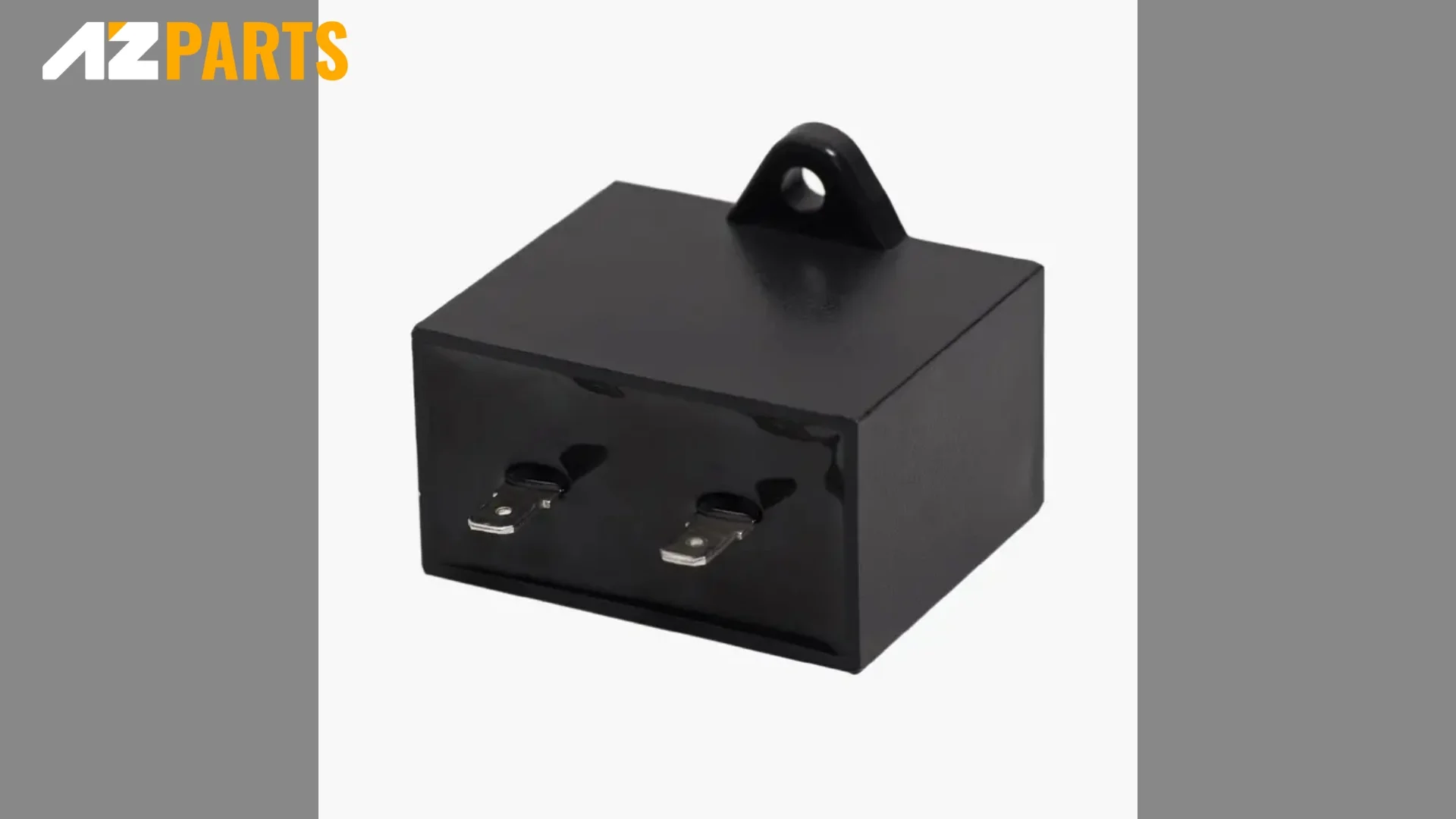
AZParts refrigerator capacitor (Source: AZParts)
5. Loose or Damaged Drain Pan
If you hear rattling or vibration sounds, especially when the compressor is running, the problem might be a loose or cracked drain pan. Located at the bottom of your fridge, this pan collects condensation and allows it to evaporate. However, if the pan is not secured properly or the mounting clip is damaged, it can shake or rattle during normal operation. This is a common but often overlooked cause of refrigerator noise.
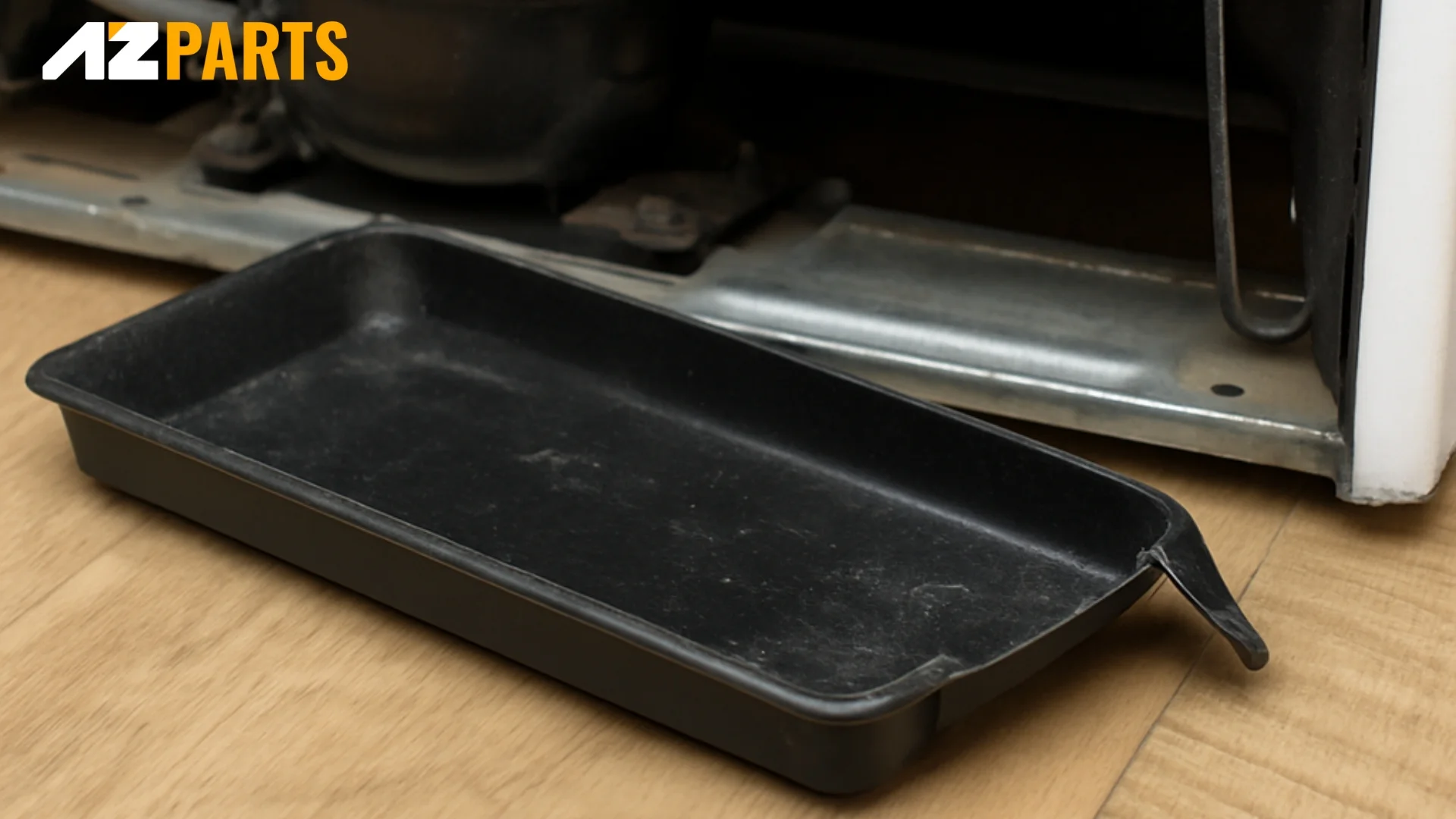
Misaligned drain pan below fridge condenser area (Source: AZParts)
Possible Causes:
- Loose drain pan mount or hanger: The pan is not held tightly, causing it to vibrate.
- Warped or cracked drain pan: A damaged pan can bounce or shift when the compressor turns on.
- Missing or broken drain clip: Without a proper clip, the pan may be misaligned.
How to Fix:
- Secure the drain pan: Reattach the pan using a new refrigerator drain clip or even a refrigerator pan hanger from AZParts to eliminate rattling noises.
- Replace the pan if damaged: Install a new drain pan from AZParts if the existing one is warped or cracked.
- Stabilize the mounting area: Make sure the pan sits firmly and does not come into contact with moving components.
6. Ice Buildup in Freezer Compartment
If your freezer is unusually loud and you notice excessive frost or ice buildup inside, it’s likely caused by a defrost system failure. When ice forms on the evaporator coils or around the fan, airflow becomes restricted and the fan can start hitting the ice, producing loud clicking or scraping noises. Therefore, it's essential to address both the symptom (ice) and the root cause (failed defrost components).
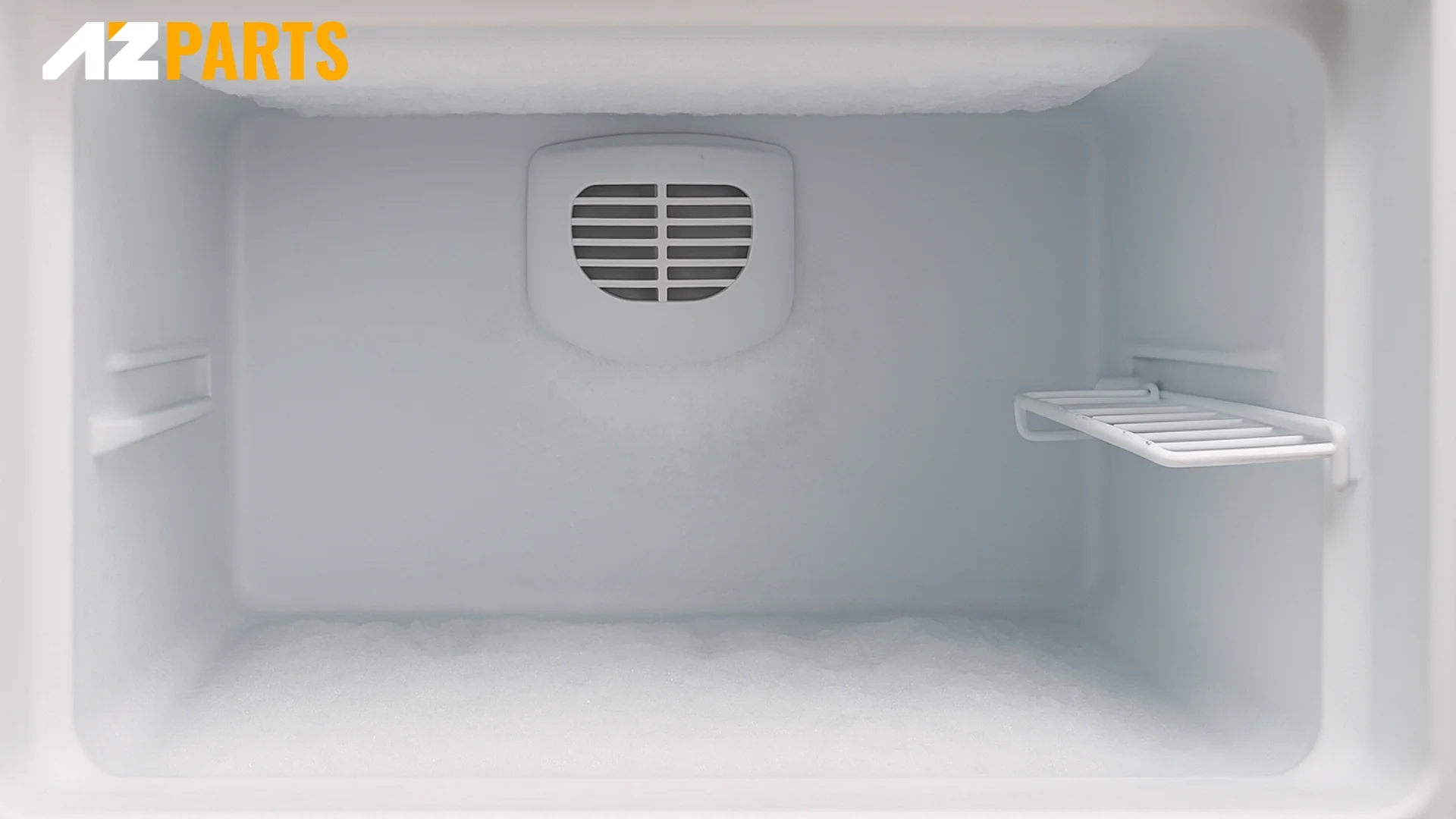
Ice buildup in freezer compartment causing noise due to airflow blockage (Source: AZParts)
Possible Causes:
- Failed defrost heater: Without regular heating cycles, frost accumulates quickly on coils.
- Faulty temperature sensor or defrost thermostat: These regulate when and how long the heater runs.
- Blocked air vents: Ice blocking vents can alter fan speed or cause fan blades to strike the ice.
How to Fix:
- Defrost the freezer completely: Unplug the unit and allow ice to melt naturally to clear blockages around the fan and vents.
- Replace the defrost heater if faulty: Test it and install a new refrigerator defrost heater from AZParts if it's not working properly.
- Check and replace the refrigerator temperature sensor: Use AZParts components to restore proper defrost function.
- Clear any blocked air vents: Use a soft cloth or warm air to open up airflow pathways inside the compartment.
7. Incorrect Refrigerator Temperature Setting
Sometimes, loud noises inside the refrigerator aren't caused by damaged parts, but by incorrect temperature settings. If the fridge or freezer is set too cold, components like fans and compressors have to work overtime, leading to unnecessary strain and excess noise. Conversely, if the temperature is set too warm, the fridge may cycle frequently or inconsistently as it tries to regulate internal conditions.
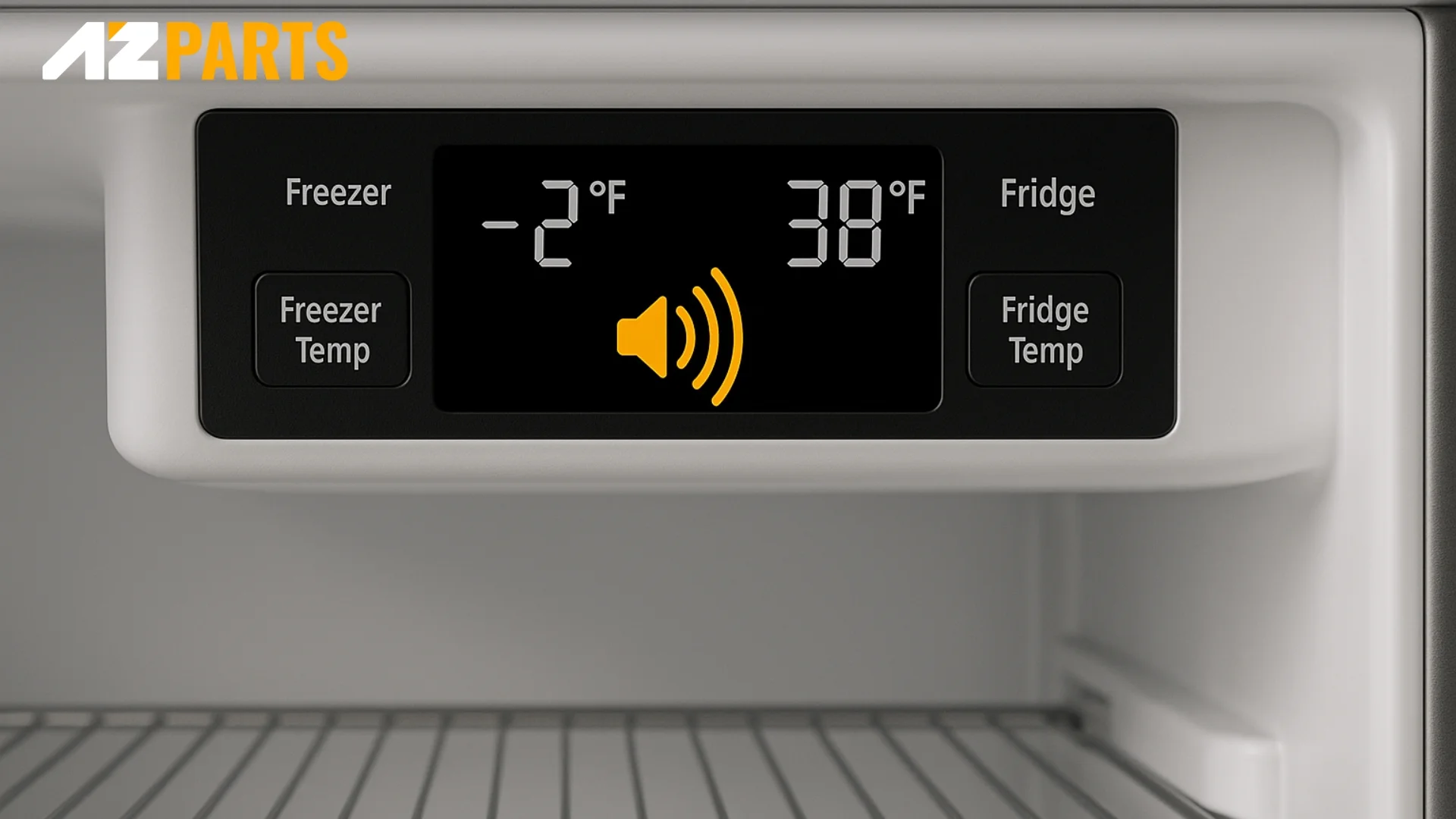
The fridge’s temperature is set too warm (Source: AZParts)
Possible Causes:
- Thermostat set too low or too high: Causes the system to run excessively or inconsistently.
- Faulty control board: Sends incorrect signals to the cooling system, affecting fan and compressor behavior.
- Temperature sensor error: Misreads internal temperature, triggering incorrect cooling responses.
How to Fix:
- Adjust temperature settings properly: Set the fridge to 37–40°F (3–4°C) and the freezer to 0°F (-18°C) to reduce strain and noise.
- Replace the thermostat if inaccurate: Use a compatible thermostat from AZParts to maintain stable internal temperatures.
- Inspect and change the control board if needed: Install a new refrigerator control board from AZParts if the current one sends faulty signals.
Neglecting such problems can lead to strain on internal components, especially the fan and airflow system. If you’re in need of replacement refrigerator parts such as a drain pan, fan motor, or defrost sensor, be sure to choose high-quality, compatible components. You can find a full selection of trusted parts at AZParts, your reliable source for refrigerator maintenance and repair solutions.
Learn more about other refrigerator's problems and how to fix them:
Contact Info
Address: 8 The Green, Ste A, Dover, Delaware 19901-3618, United States
Email: support@azparts.com
Refrigerator
Further Reading
Further Reading

